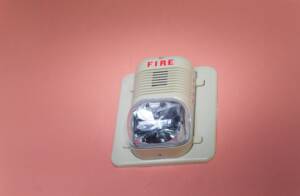Choosing the Right Smoke Alarm for Those with Hearing Loss
If you or a family member is deaf or suffers from severe hearing loss, you may have some additional concerns when it comes to fire safety and choosing the right fire alarm or smoke detector. Fortunately, there are several great deaf-friendly smoke alarm options available on the market.
Why Having the Right Smoke Alarm Matters
Having the right smoke alarm will ensure people with hearing loss get instant alerts of a potential fire. With prompt fire detection comes quicker reaction time, allowing time to escape, and thus reducing the risk to your life and safety.
Choosing a Smoke Alarm That Works for You
When choosing a smoke alarm for those suffering from hearing issues, don’t just pick any smoke detector and hope it’ll work for you. Instead, make an informed decision and choose a unit that best adapts to your hearing loss, lifestyle, and preference. Keep in mind, some detectors may require batteries for power, but you might want to investigate the cost of having your alarm hard-wired instead if you haven’t done so already.
What to Look for in Alarms If You Have Hearing Loss
Here are some different types of alarms and other factors you should consider when buying an alarm for the home of someone with hearing issues:
- Strobe light alarms: As the name suggests, these alarms emit intermittent flashing lights when triggered by fire or smoke particles. Unfortunately, these units are not an excellent option for older adults because they tend to be less responsive to strobe lights, according to NFPA.
- Vibrating smoke alarms: These alarms use vibration to signal deaf and hard-of-hearing individuals when there is a smoke or fire condition in their building. The vibrations may be delivered through a bed shaker, pillow, or mattress. This type of system is an ideal option for all age groups—from kids to seniors. It’s also an excellent choice for heavy sleepers.
- Different types of sensors to consider: The two basic types of smoke alarm sensors you should be aware of are photoelectric and ionization sensors. Photoelectric smoke sensors use a beam of light to detect the presence of fire or smoke. In comparison, ionization smoke sensors have a very small amount of radioactive material between two electrically charged plates. These plates ionize the air, causing a current to flow between the plates. When smoke enters the chamber, the flow of ions is disrupted, thus reducing the current’s flow and activating the alarm. For best protection, it’s advisable to invest in a unit that uses both ionization and photoelectric sensor systems.
How to Call 911 If You Can’t Hear the Operator
Contacting the proper authorities by phone if you’re hard of hearing can be a bit difficult. The doctors at Associated Hearing Professionals suggest using this format:
“My name is _______. I cannot hear. My emergency is _________. I need help at this address_________. Please send help.”
Our doctors suggested that you repeat this several times and do not get off the phone until help arrives.
Collaborate with Professionals for More Information
For additional notes on what smoke alarm would work best for your individual hearing loss needs, contact the experts at Associated Hearing Professionals in St. Louis. Our team can provide you with additional hearing tests and match you with the proper hearing aids you’ll need to ensure your comfort and safety. Contact us at 314-626-8213 to book an appointment.

